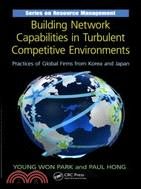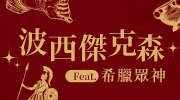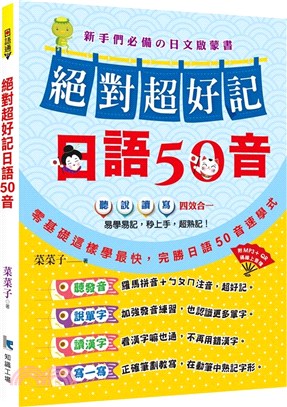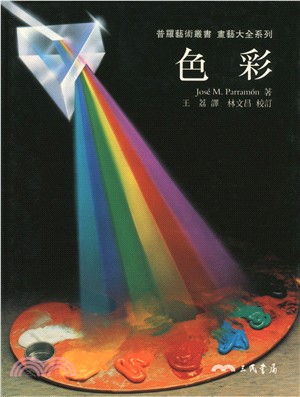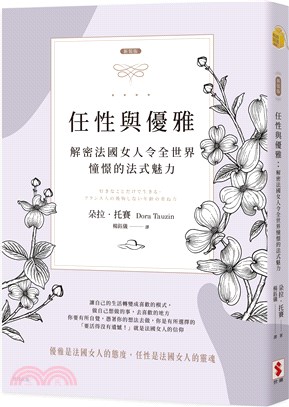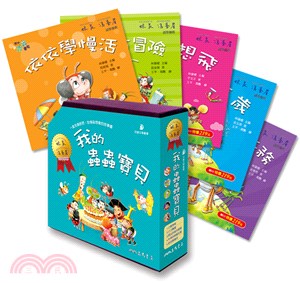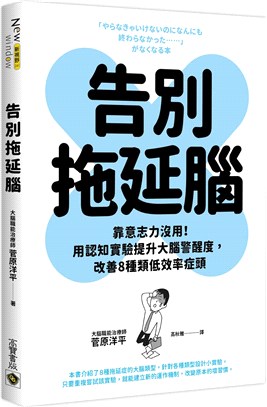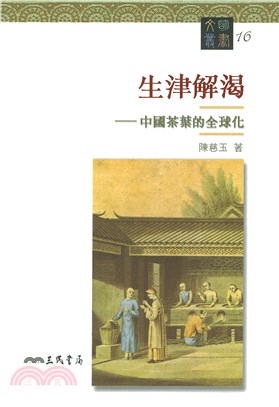Building Network Capabilities in Turbulent Competitive Environments:Practices of Global Firms from Korea and Japan
商品資訊
ISBN13:9781439850688
出版社:CRC Press UK
作者:Young Won Park and Paul Hong
出版日:2011/11/23
裝訂/頁數:精裝/358頁
規格:23.5cm*15.9cm*2.5cm (高/寬/厚)
版次:1
定價
:NT$ 5654 元優惠價
:90 折 5089 元
若需訂購本書,請電洽客服 02-25006600[分機130、131]。
商品簡介
作者簡介
目次
相關商品
商品簡介
Since the start of the recent financial crisis, as most global firms struggle to remain competitive, an increasing number of Korean and Japanese firms have experienced an amazing rate of growth and expansion. Although academic researchers and business leaders in the United States, China, Brazil, India, and Europe seek out the secrets to these businesses’ success, little is known about their business practices.
Supplying an insider’s perspective, Building Network Capabilities in Turbulent Competitive Environments: Practices of Global Firms from Korea and Japan unveils the strategic and operational practices that have allowed these firms to catch and surpass their competitors in North America and Europe. Based on fieldwork studies and extensive interviews with senior executives, it explains how these companies have developed and enhanced their core competencies through effective integration of product architecture, supply chain management, and IT strategy.
The book provides practical insight into changing business patterns while avoiding extensive mathematical algorithms and drawn-out theoretical descriptions. It uses cutting-edge case studies to illustrate the innovative manufacturing strategies of these rapidly emerging companies. Accessible to anyone with a basic understanding of business, it reveals the organizational processes of strategy formulation and implementation that are required for success.
Providing a clear understanding of both the career implications of the changing business landscape and how to deliver products and services that meet and exceed the needs of your customers, this book will help you develop the socio-technical skills needed to succeed in an increasingly competitive and turbulent business environment.
Supplying an insider’s perspective, Building Network Capabilities in Turbulent Competitive Environments: Practices of Global Firms from Korea and Japan unveils the strategic and operational practices that have allowed these firms to catch and surpass their competitors in North America and Europe. Based on fieldwork studies and extensive interviews with senior executives, it explains how these companies have developed and enhanced their core competencies through effective integration of product architecture, supply chain management, and IT strategy.
The book provides practical insight into changing business patterns while avoiding extensive mathematical algorithms and drawn-out theoretical descriptions. It uses cutting-edge case studies to illustrate the innovative manufacturing strategies of these rapidly emerging companies. Accessible to anyone with a basic understanding of business, it reveals the organizational processes of strategy formulation and implementation that are required for success.
Providing a clear understanding of both the career implications of the changing business landscape and how to deliver products and services that meet and exceed the needs of your customers, this book will help you develop the socio-technical skills needed to succeed in an increasingly competitive and turbulent business environment.
作者簡介
Dr. Young Won Park is an associate professor of Manufacturing Management Research Center at the University of Tokyo, Japan. Dr. Park holds a Ph.D. degree in the Department of Advanced Social and International Studies from the University of Tokyo, Japan. His articles have been published in journals including Management Decision, International Journal of Production Economics, International Journal of Services and Operations Management, International Journal of Logistics Systems and Management, Japan Academy of International Business Studies, Japanese Society for Science and Technology Studies, and the Japan Society of Information and Communication Research. He has received research awards including dissertation paper awards from the Japan Association for Social Informatics (JASI), best paper awards from the Japan Society of Information and Communication Research (JSICR), research awards of the Social Science Field from the Telecommunications Advancement Foundation (TAF), and research students awards of the Social Science Field from the Telecommunications Advancement Foundation (TAF). His research interests are in technology management, IT strategy, and global supply chain management.
Dr. Paul Hong is a professor of operations management at the University of Toledo, Ohio, in the United States. Dr. Hong holds a Ph.D. degree in manufacturing management and engineering from the University of Toledo. He also holds an MBA and an MA in economics from Bowling Green State University and a BA from Yonsei University in Seoul, Korea. His articles have been published in journals including Journal of Operations Management, International Journal of Operations and Production Management, International Journal of Production Economics, International Journal of Production Research, Management Decision, Journal of Supply Chain Management, European Journal of Innovation Management, Journal of Enterprise Information Management, Journal of Knowledge and Information Management, International Journal of Quality and Reliability Management, Benchmarking: An International Journal, Strategic Outsourcing: An International Journal, Research in International Business and Finance, Korean Journal of Tourism Research, and Tourism Culture and Science. His research interests are in technology management, operational strategy, and global supply chain management. He is International Research Network Coordinator of Annual Symposium and Workshop in Global Supply Chains. He is also US coordinator of International Manufacturing Strategy Survey (IMSS).
Dr. Paul Hong is a professor of operations management at the University of Toledo, Ohio, in the United States. Dr. Hong holds a Ph.D. degree in manufacturing management and engineering from the University of Toledo. He also holds an MBA and an MA in economics from Bowling Green State University and a BA from Yonsei University in Seoul, Korea. His articles have been published in journals including Journal of Operations Management, International Journal of Operations and Production Management, International Journal of Production Economics, International Journal of Production Research, Management Decision, Journal of Supply Chain Management, European Journal of Innovation Management, Journal of Enterprise Information Management, Journal of Knowledge and Information Management, International Journal of Quality and Reliability Management, Benchmarking: An International Journal, Strategic Outsourcing: An International Journal, Research in International Business and Finance, Korean Journal of Tourism Research, and Tourism Culture and Science. His research interests are in technology management, operational strategy, and global supply chain management. He is International Research Network Coordinator of Annual Symposium and Workshop in Global Supply Chains. He is also US coordinator of International Manufacturing Strategy Survey (IMSS).
目次
HISTORY
What is Network Capability?: Introduction, Framework, and ContentsTwenty-First Century Global Business Environment Changing Product Architecture with the Transition from Analog to Digital Network Capability: A New Condition for Effective Responses in Global Business EnvironmentLiterature Review on Network Capability Core Competence and Network Capability Product Architecture, SCM, and Network Capability Innovation and Network CapabilityOrganization of the Book
Korean IT Industry and Network Leadership: A Comparative Study with Japanese ExperiencesIntroductionAn Analysis of Economic Growth Models of East Asia Literature Review Research FrameworkCase Analysis Korean and Japanese Second-Generation Mobile Communication Industry Success of Korean CDMA Industry Background of CDMA Industry Development Success Factor of CDMA Industry CDMA Industry Spreading EffectImplications of Korean IT Industry Success Factors Importance of Network Formation Standardization Issue Summary of Korean IT Industry’s Success FactorsDiscussion
Growth Mechanism and Management of Korean Firms: A Comparative Study with Japanese ExperiencesIntroductionLiterature Review Firm Growth Model and Learning Theory Research FrameworkCase Studies Electronic Industry Growth Process of Samsung Electronics (SE) Technological AccumulationStage through Organizational Learning Spillover Stage (Horizontal Extension) Automotive Industry Growth Processes of Hyundai-Kia Motor Company (HKMC) Technology Accumulation through Learning Spillover (Horizontal Expansion) Stages Spillover (Horizontal Expansion) MechanismConclusion
Product Architecture and Technology Transfer: New Catch-Up Pattern in Digital EraIntroductionProduct/Process Architecture and Global Competitive AdvantageProduct Architecture and Technology Transfer Growth of Japanese Firms and Technology Transfer Product Architecture and TechnologyCase Studies CD-ROM/DVD Industry TV IndustryDiscussion
CASE STUDIES OF KOREAN IT INDUSTRY
Korean Semiconductor Industry: A Comparative Study with Japanese CounterpartIntroductionAn Analysis of Semiconductor Industry from Architecture-Based Perspective Structure and Characteristics of Semiconductor Industry A History of the Semiconductor Industry from an Architecture-Based PerspectiveChanging Korean Semiconductor Patterns (From Memory to Logic Semiconductors)Korean and Japanese Semiconductor Industries and Future ProspectsDiscussion
Korean LCD Industry: Product Architecture and Global Supply Chain Management of LCDIntroductionProduct Architecture and SCM (Supply Chain Management) of LCD Product Architecture of LCD LCD and SCM (Supply Chain Management)Structure of LCD Industry and Investment of Korean LCD Firms Changing Structure of Value Chain System of the LCD Industry Korean Firms Position in the LCD TV Market and Investment StatusSCM Strategies of Korean LCD Makers Building SCM System by LCD Firms SCM System Building Effort by Samsung SCM System of LG Display Vertical Integration Strategy of LCD architectureFuture Challenges for the Korean Upstream Component Parts Industry
Korean TV Industry: A Case Study of LG ElectronicsIntroductionProduct Architecture and Operation Management Integral Product Architecture and Modular Product Architecture Hierarchy of Product Architecture in FPD TV LCD and PDPCase Study Case Background Case Analysis Integration of Panels and SCM System Efficient Mass Production through Implementation of LGPS (LG Production System)Discussion
Korean Mobile Phone Industry: Product Architecture of Mobile Phones and Network CapabilityIntroductionProduct Architecture of Mobile Phones Smartphone and InnovationNew Product Development of Korean Handset Firms Global Competitiveness of Korean Mobile Phone Makers Product Development Strategy of Korean Handset MakersProduct Development Strategy of Korean Firms and Smartphone Responsive Strategy Comparison of Samsung and LG Product Development Smartphone and Business Model of Mobile Communication IndustryDiscussion
INFRASTRUCTURE OF IT CAPABILITY
Suppliers Support for Supply Chain Integration: Korean Automobile Industry and the Steel IndustryIntroductionLiterature Review Collaboration and Information Integration between OEM and Its Suppliers South Korea Government’s Policy to Support SMEsCase Studies Hyundai-Kia Automotive Group (HKAG) Description of the Firm Coexistence Cooperation with Suppliers POSCO Company History POCSO’s 3.0 Innovation Projects POSCO Innovation and Collaboration with SuppliersDiscussion
Product Development of Japanese Electronics IndustryIntroductionProduct Architecture and CAD Usage Design Idea and Product Architecture Measure Product Architecture and CAD UsageResearch Model and Framework Research Framework Research MethodsResults Component Parts Statistics of Investigated Products Product Architecture and Measurement Results Electronic Product Development and CAD UsageConclusion
IT Usage Strategy of Korean Firms: Case Studies of Mobile Display ManufacturersIntroductionLiterature Review SCM and Database Integration Capability Research ModelCase Studies Case A Case BDiscussion
IT Usage Strategy of Japanese Firms: Product Lifecycle Management for the Global MarketIntroductionLiterature Review Global Issues of Product Lifecycle Management A Research FrameworkCase Studies Case A Conversion of Product Architecture in Response to Global Marketing The Results of Changing Product Architecture Case B Adoption of a Design Navigation System System Adoption Results Case C Design Localization for Local Product Results of Adoption Case D Global BOM (Bill of Materials)Conclusion
Integrated Manufacturing and IT Strategy for Futuristic PLM: A Conceptual Framework from Japanese FirmsIntroductionLiterature Review Past and Future of Product Lifecycle Management A Framework of Futuristic PLMCase Studies Case A Case B Case CDiscussion
ConclusionReferences
What is Network Capability?: Introduction, Framework, and ContentsTwenty-First Century Global Business Environment Changing Product Architecture with the Transition from Analog to Digital Network Capability: A New Condition for Effective Responses in Global Business EnvironmentLiterature Review on Network Capability Core Competence and Network Capability Product Architecture, SCM, and Network Capability Innovation and Network CapabilityOrganization of the Book
Korean IT Industry and Network Leadership: A Comparative Study with Japanese ExperiencesIntroductionAn Analysis of Economic Growth Models of East Asia Literature Review Research FrameworkCase Analysis Korean and Japanese Second-Generation Mobile Communication Industry Success of Korean CDMA Industry Background of CDMA Industry Development Success Factor of CDMA Industry CDMA Industry Spreading EffectImplications of Korean IT Industry Success Factors Importance of Network Formation Standardization Issue Summary of Korean IT Industry’s Success FactorsDiscussion
Growth Mechanism and Management of Korean Firms: A Comparative Study with Japanese ExperiencesIntroductionLiterature Review Firm Growth Model and Learning Theory Research FrameworkCase Studies Electronic Industry Growth Process of Samsung Electronics (SE) Technological AccumulationStage through Organizational Learning Spillover Stage (Horizontal Extension) Automotive Industry Growth Processes of Hyundai-Kia Motor Company (HKMC) Technology Accumulation through Learning Spillover (Horizontal Expansion) Stages Spillover (Horizontal Expansion) MechanismConclusion
Product Architecture and Technology Transfer: New Catch-Up Pattern in Digital EraIntroductionProduct/Process Architecture and Global Competitive AdvantageProduct Architecture and Technology Transfer Growth of Japanese Firms and Technology Transfer Product Architecture and TechnologyCase Studies CD-ROM/DVD Industry TV IndustryDiscussion
CASE STUDIES OF KOREAN IT INDUSTRY
Korean Semiconductor Industry: A Comparative Study with Japanese CounterpartIntroductionAn Analysis of Semiconductor Industry from Architecture-Based Perspective Structure and Characteristics of Semiconductor Industry A History of the Semiconductor Industry from an Architecture-Based PerspectiveChanging Korean Semiconductor Patterns (From Memory to Logic Semiconductors)Korean and Japanese Semiconductor Industries and Future ProspectsDiscussion
Korean LCD Industry: Product Architecture and Global Supply Chain Management of LCDIntroductionProduct Architecture and SCM (Supply Chain Management) of LCD Product Architecture of LCD LCD and SCM (Supply Chain Management)Structure of LCD Industry and Investment of Korean LCD Firms Changing Structure of Value Chain System of the LCD Industry Korean Firms Position in the LCD TV Market and Investment StatusSCM Strategies of Korean LCD Makers Building SCM System by LCD Firms SCM System Building Effort by Samsung SCM System of LG Display Vertical Integration Strategy of LCD architectureFuture Challenges for the Korean Upstream Component Parts Industry
Korean TV Industry: A Case Study of LG ElectronicsIntroductionProduct Architecture and Operation Management Integral Product Architecture and Modular Product Architecture Hierarchy of Product Architecture in FPD TV LCD and PDPCase Study Case Background Case Analysis Integration of Panels and SCM System Efficient Mass Production through Implementation of LGPS (LG Production System)Discussion
Korean Mobile Phone Industry: Product Architecture of Mobile Phones and Network CapabilityIntroductionProduct Architecture of Mobile Phones Smartphone and InnovationNew Product Development of Korean Handset Firms Global Competitiveness of Korean Mobile Phone Makers Product Development Strategy of Korean Handset MakersProduct Development Strategy of Korean Firms and Smartphone Responsive Strategy Comparison of Samsung and LG Product Development Smartphone and Business Model of Mobile Communication IndustryDiscussion
INFRASTRUCTURE OF IT CAPABILITY
Suppliers Support for Supply Chain Integration: Korean Automobile Industry and the Steel IndustryIntroductionLiterature Review Collaboration and Information Integration between OEM and Its Suppliers South Korea Government’s Policy to Support SMEsCase Studies Hyundai-Kia Automotive Group (HKAG) Description of the Firm Coexistence Cooperation with Suppliers POSCO Company History POCSO’s 3.0 Innovation Projects POSCO Innovation and Collaboration with SuppliersDiscussion
Product Development of Japanese Electronics IndustryIntroductionProduct Architecture and CAD Usage Design Idea and Product Architecture Measure Product Architecture and CAD UsageResearch Model and Framework Research Framework Research MethodsResults Component Parts Statistics of Investigated Products Product Architecture and Measurement Results Electronic Product Development and CAD UsageConclusion
IT Usage Strategy of Korean Firms: Case Studies of Mobile Display ManufacturersIntroductionLiterature Review SCM and Database Integration Capability Research ModelCase Studies Case A Case BDiscussion
IT Usage Strategy of Japanese Firms: Product Lifecycle Management for the Global MarketIntroductionLiterature Review Global Issues of Product Lifecycle Management A Research FrameworkCase Studies Case A Conversion of Product Architecture in Response to Global Marketing The Results of Changing Product Architecture Case B Adoption of a Design Navigation System System Adoption Results Case C Design Localization for Local Product Results of Adoption Case D Global BOM (Bill of Materials)Conclusion
Integrated Manufacturing and IT Strategy for Futuristic PLM: A Conceptual Framework from Japanese FirmsIntroductionLiterature Review Past and Future of Product Lifecycle Management A Framework of Futuristic PLMCase Studies Case A Case B Case CDiscussion
ConclusionReferences
主題書展
更多
主題書展
更多書展本週66折
您曾經瀏覽過的商品
購物須知
外文書商品之書封,為出版社提供之樣本。實際出貨商品,以出版社所提供之現有版本為主。部份書籍,因出版社供應狀況特殊,匯率將依實際狀況做調整。
無庫存之商品,在您完成訂單程序之後,將以空運的方式為你下單調貨。為了縮短等待的時間,建議您將外文書與其他商品分開下單,以獲得最快的取貨速度,平均調貨時間為1~2個月。
為了保護您的權益,「三民網路書店」提供會員七日商品鑑賞期(收到商品為起始日)。
若要辦理退貨,請在商品鑑賞期內寄回,且商品必須是全新狀態與完整包裝(商品、附件、發票、隨貨贈品等)否則恕不接受退貨。



